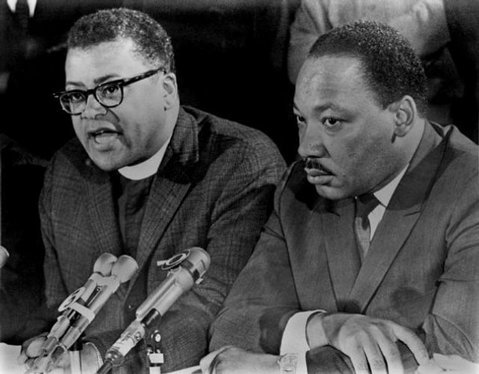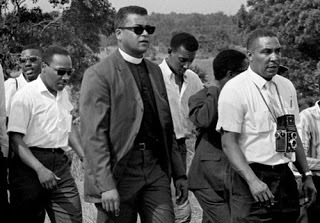Put Down The Gun: An Interview with Civil Rights Activist Rev. James Lawson
 Put Down The Gun: An Interview with Civil Rights Activist Rev. James Lawsonby Charles Bane, Jr. | special to NewBlackMan (in Exile)
Put Down The Gun: An Interview with Civil Rights Activist Rev. James Lawsonby Charles Bane, Jr. | special to NewBlackMan (in Exile)When history made its sculpture of Dr. Martin Luther King, Jr., it unwittingly cast aside shards of hundred of important lives that contributed to the artwork: Rev. Fred Shuttlesworth set his fierce courage against the grim features of Bull Connor. Freedom Rider John Lewis routinely washed blood from his clothes. Mamie Till Mobely had sacrificed her only child.
Martin Luther King , Jr. was a consummate strategist: he had to be: lives depended on it. So perhaps it was a young minister, James Lawson, who presented to the civil rights movement its finest gift--Lawson's personal encounter with non--violence in India. King gazed at the gift as if under a lens: a new world jumped to life.
CB: When did you first travel to India?
Rev. Lawson: In 1953. I had originally signed up for a three year term to teach, under a program offered by the bishop of my church. I wanted to take a Christian path. I wanted to live in a different setting and see what Jesus would mean to me in the context of other cultures. But the F.B.I. arrested me in 1950 for resisting the draft, a "felony against the draft act." I went to jail for 13 months.But I stayed in touch with the Church Board about teaching and finally went as a missionary.
Gandhi was a major teacher for me. I had read his autobiography, My Experiment With Truth in 1947 and I read the series of books that followed his death in 1948. I began to practice methods of non- violence in America in matters of race. I tested restaurants myself.
CB. When did your path cross with Dr. King's?
Rev. Lawson: In 1957 in Oberlin, Ohio. I had returned from India to Oberlin Graduate School of Divinity. He came to speak in February. There was a small lunch, so we had the chance to have a private conversation and come to know one another. It was...a common kinship and spirituality. He had a phenomenal commitment to liberation and justice for people of color, and the nation. In college, I had always said to myself that, one day, I wanted to work in the South, to help. I told him that, and he said, " Don't wait. Come now. We don't have anyone with your experience or skills. " He was referring to my ministry. I told him I'd get there as fast as I could.
CB: You began conducting workshops in non-violence.
Rev. Lawson: In February, 1958.S Some initial workshops in troubled places--Little Rock, Birmingham--and then in March we began a series of workshops in Nashville. Those workshops covered major issues of non- violence. Gandhian principles, issues of American history, role- playing. We wanted to prepare people to become the troops of non- violence. We invited them to infuse non- violence into their personal lives and we used the Montgomery bus boycott as an illustration of its potential for success and change. I was elected to the executive committee of the Nashville Christian Leadership Council and we were agreed we wanted to take action in Nashville. We decided to begin desegregating downtown Nashville in September.
 CB : Do you believe the workshops had a profound effect on the civil rights movement?
CB : Do you believe the workshops had a profound effect on the civil rights movement?Rev. Lawson: Yes. Almost anyone will say to you that the workshops had a critical effect on key organizers: C.T. Vivian, John Lewis, Marion Barry, in Selma, Mississippi and elsewhere. We all spent time in Mississippi jails. And it was critical to the Freedom Rides of 1961.
CB: You were a key organizer yourself in Birmingham. Was that a turning point?
Rev. Lawson: Birmingham brought one of the great breakthroughs: the Civil Rights Act, solidified by the Washington March. But people today have taken their eyes off a need for...redemption. America has yet to come to terms with race.
CB: How had Indian principles of non-violence become the foundation of Christian activism?
Rev. Lawson: Listen to me. King came from a Black church. So did I. Our non- violence began with Jesus.Gandhi himself said, when he read the Sermon On The Mount, "This is it." Many people back then pretended that non- violence wasn't a form of power. I didn't. In 1947, I'd discovered the pacifism that was secret in Christianity.
CB: You were chairman of the sanitation workers strike in Memphis in 1968?
Rev. Lawson: I was living there since 1962, pastor of a Memphis church. I was not at the Lorraine ( Motel ) at that hour. I had gone on to court. I visited with him that morning. We were preparing a march on April 5th. As I recall, I was on my way to court to stop the injunction. We had agreed the injunction would not stop us from marching on Friday. I was getting ready to eat supper with my wife, Dorothy and our children and the T.V. was on. I ...choked up immediately. I said, ' I have to go make certain we're going to march. I have to make certain we all stay calm.' I went on the radio at a Black station and spoke for calm. I said, ' Come to Clayburn Temple AME Church to carry on the march'. We didn't yet know he was dead. I said, ' If you loved DR. King, we know he would expect us to do this.' There was a ticker tape right at the station, so the news came directly from St. Francis Hospital. I went back on the air and spoke again for calm . Other places burned, but not Memphis.
CB: You're continuing , in retirement, to conduct non- violence workshop?
Rev. Lawson: I'm doing workshops with high school students. The problem isn't kids, it's adults. It's the government. If given the chance to to look for truth and justice, young people are the first to opt for it.
CB: What does the principle of non- violence represent to you?
Rev. Lawson: It's the unheralded but heroic option of the human race.Put down the gun. Pick up better ways to make ourselves better people. It is the 'either / or ' crossroads for this country. King said: ' It is either non-violence or non-existence.'
+++Charles Bane, Jr. is a second generation civil rights activist and author of The Chapbook ( Curbside Splendor ) , Love Poems ( Aldrich Press) , and Three Seasons: Writing Donald Hall ( Collection of Houghton Library, Harvard University ). He created and contributes to The Meaning Of Poetry series for The Gutenberg Project, and is a current nominee as Poet Laureate of Florida.
Published on July 08, 2015 14:22
No comments have been added yet.
Mark Anthony Neal's Blog
- Mark Anthony Neal's profile
- 30 followers
Mark Anthony Neal isn't a Goodreads Author
(yet),
but they
do have a blog,
so here are some recent posts imported from
their feed.



